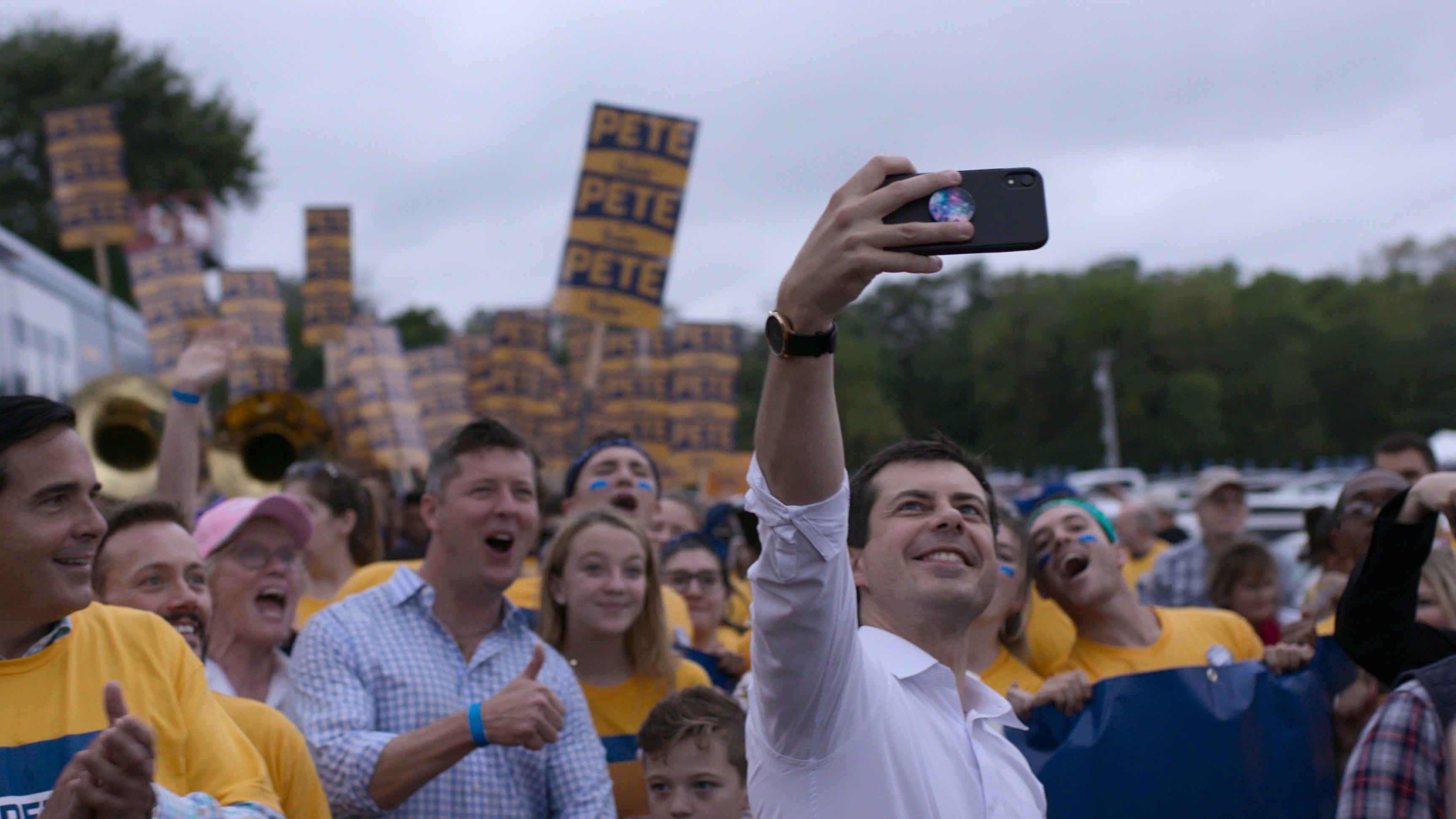Mayor Pete can’t find the warmth beneath the wonk of the former presidential candidate
Pete Buttigieg isn’t a terribly exciting documentary subject… which is part of what makes the documentary about him interesting

At long last, it was official: Pete Buttigieg—the 38-year-old former mayor of South Bend, Indiana, running his first national campaign—had won the Iowa caucuses (by the measure that apportions delegates, albeit not the popular vote). The news took several days to break, thanks to issues involving a mobile app being used to report voting totals; nobody was sure, for a while, whether Buttigieg or Bernie Sanders had prevailed. (It certainly wasn’t Joe Biden, who finished a distant fourth.)
Buttigieg, much more than Sanders, desperately needed the boost in profile and momentum that being declared the winner in Iowa could provide. His communications director, Lis Smith, practically started vibrating when the story hit her smartphone. Chasten, Pete’s husband, could be seen dancing ecstatically to no music at all. Everyone on the team was visibly elated… except Pete, who, upon being told that he’d finally, definitively won, glanced briefly at the documentary film camera that was then following him around, smiled, and quietly remarked, “How about that?”
Directed by Jesse Moss (Boys State), Mayor Pete rarely strays far from the War Room template that’s now firmly established for behind-the-scenes campaign docs. Moss embedded himself with the Buttigieg campaign not long after it kicked off, and the film primarily sticks to the 11 months between Pete’s formal declaration and the South Carolina primary, after which he chose to drop out and throw his support to Biden. Buttigieg collapsed largely because he failed to attract Black voters (or non-white voters generally), a reality that’s acknowledged here without ever really being explored.
Surprisingly, though, neither is the emphasis particularly on Buttigieg as the first openly gay Presidential candidate in American history to look as if he might have a real shot at becoming his party’s nominee. (A gay Republican candidate, Fred Karger, got nowhere back in 2012.) Instead, Moss spends the better part of a year just trying to get his subject to betray some raw emotion, even going so far as to have Chasten pose interview questions at one point. It’s not as if Buttigieg stonewalls the camera, either. He’s just not, at heart, a very demonstrative guy.
How much does that matter for a politician? Obviously, Buttigieg has done quite well for himself: becoming mayor of a minor metropolitan area (sorry, South Benders) at age 30; proving that a married gay man could overcome deeply ingrained prejudice to become a serious contender on a national level; making history as the first openly gay Cabinet member (now in position, as Secretary Of Transportation, to allocate much of the massive infrastructure bill that Congress just finally passed). Yet much of the semi-candid footage in Mayor Pete consists of staff members expressing frustration with his relative lack of affect, urging him to make his public story more personal. When Buttigieg answers a debate-prep question about white male privilege, pointing out ways in which being gay has made him an outsider at times, Smith interrupts him with a sharp rebuke: “You’re going through all of these things like you’re reading a fucking shopping list… You’re not, like, fuckin’, an anthropologist here. This is, like, a thing that you feel.” Chasten puts it more delicately when interviewed, but likewise registers concern about whether the caring, passionate guy he married comes across that way to potential voters.
What’s particularly interesting about this dilemma—if not quite interesting enough to distinguish Mayor Pete from the numerous other documentaries of its ilk—is that Buttigieg doesn’t come across as stiff or robotic, the way that Al Gore sometimes could. There’s never a sense of someone who’s merely regurgitating memorized talking points. He’s personable, animated, empathetic, easy to like. You just never feel as if you’ve been invited behind the curtain.
And maybe, ultimately, that’s merely because Buttigieg is guarded—not as a political strategy, but by nature. When Smith barks at him for seeming insufficiently emotional, he absorbs the criticism with the exact same impassivity that she’s decrying, simply mentally noting it for the record. When Chasten makes an observation (that’s unmistakably a pained complaint) about being the only spouse who wasn’t onstage at one event, Buttigieg deftly avoids letting it become an argument. Giving vent simply isn’t his thing. “It was always framed as, like, let loose, be yourself,” he tells Moss, in an interview conducted after he suspended the campaign. “But to do that would not be myself.” That sort of even-keeled candor doesn’t make for an exciting movie, but it does raise cogent questions about why we demand excitement from our public servants, and whether we should.